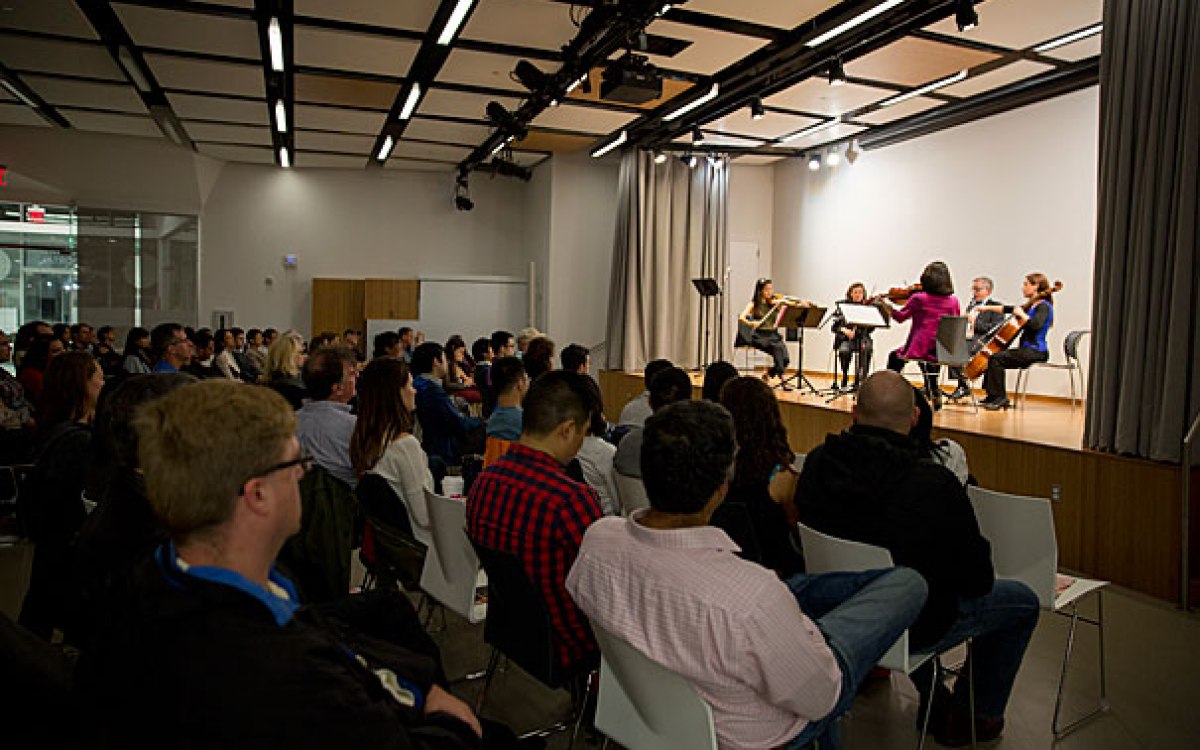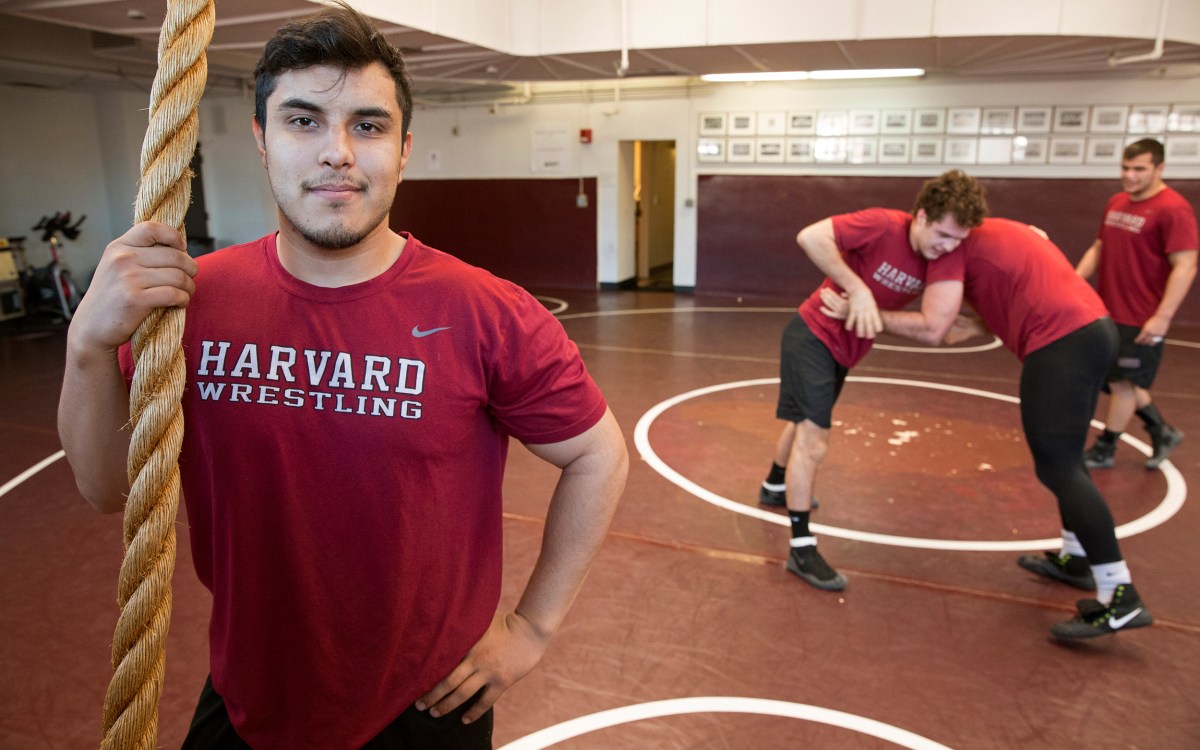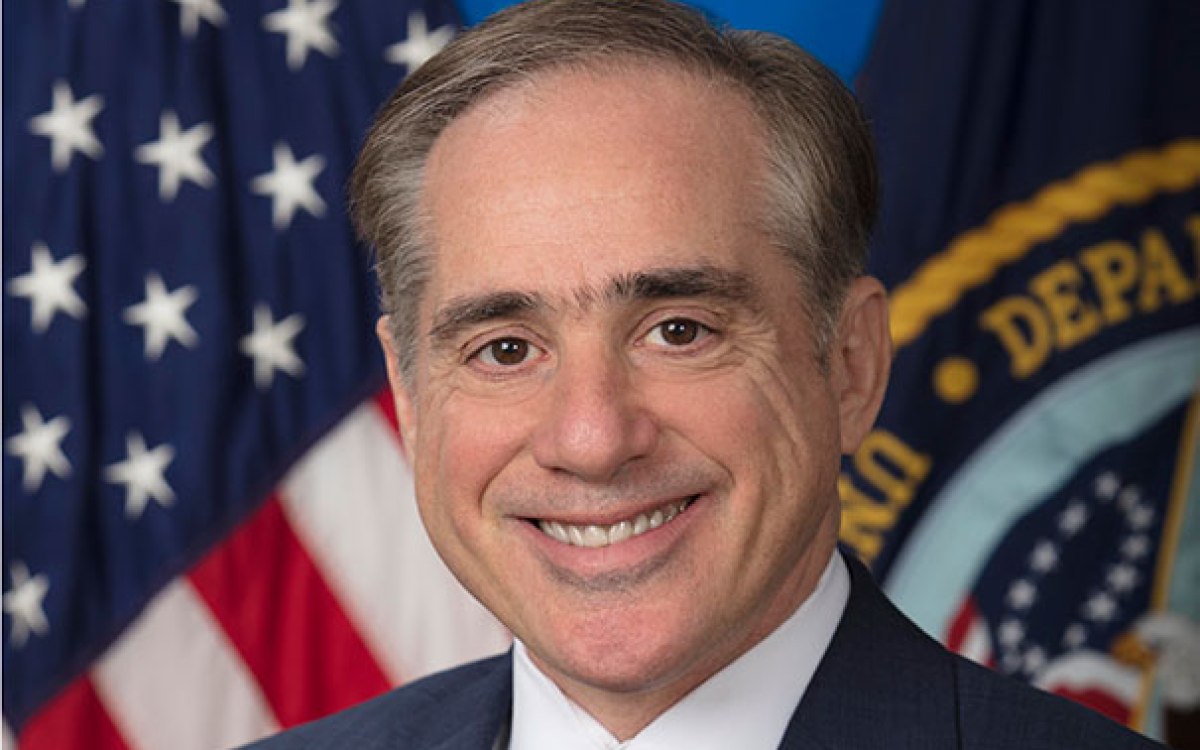Video by Kai-Jae Wang and Justin Saglio/Harvard Staff
Soldiers’ songs of pain — but also healing
Crafting war ballads, and thereby facing memories, appears to reduce veterans’ PTSD, study says
Songs of war and of friends who didn’t make it home might not seem like music to comfort struggling veterans. But a project to write songs using individual soldier’s combat experiences appears to help, according to a recent study, lessening the impact of trauma held too close for too long.
Recalling his session with songwriter James House, Navy veteran John Oliveira, who served tours in Iraq and Afghanistan, said, “It was probably one of the most emotionally draining — and I want to say, physically and mentally draining as well — experiences, over that couple of hours that I sat with Jim and came up with this song. It’s just difficult stuff.”
In September, Oliveira was one of 10 current and former service members who participated in a scientific trial of an innovative therapeutic program pioneered in 2011 by Texas-based singer/songwriter Darden Smith.
The study, led by two Harvard Medical School (HMS) faculty members and Massachusetts General Hospital clinicians, Ronald Hirschberg and Louisa Sylvia, sought to apply scientific rigor to a technique that Smith and other songwriters have turned to more than 400 times during retreats organized by the nonprofit SongwritingWith:Soldiers. Four weeks after the songwriting sessions, study participants reported a 33 percent decline in PTSD symptoms and a 22 percent decline in depression symptoms.
The trial was conducted in Charlestown at Home Base, a joint program of Massachusetts General Hospital and the Red Sox Foundation, dedicated to helping veterans overcome anxiety, depression, post-traumatic stress disorder, and other “invisible wounds of war.”
“I’m a good dad now. I have it in me, with a little more treatment, to be a great dad.”
Blair Morin
The songwriting process — which involves veterans talking through their trauma while a songwriter listens and crafts the lyrics and music — unveiled sometimes wrenching memories that were dredged up in prescribed daily listening sessions, yet the participants said putting their stories into song helped them deal with the frustration and anger that can overcome them when confronting the daily inconveniences of modern life.
“I actually grew to look forward to the song,” said Blair Morin, an Air Force medic who served two combat tours attached to infantry units. “I was actually listening to it twice most days. I have about an hourlong commute to work, so it was real easy when I started getting frustrated with traffic or anything throughout my work day to put the song on, and it kind of grounded me. It made me think, ‘Traffic sucks, I’m going to get through it,’ and my day could get better from there.”
Another benefit, participants said, is that the recordings helped them share their difficult-to-talk-about stories with loved ones, some of whom were hearing details for the first time.
“My wife listens to it regularly,” Morin said. “[The songwriter] brought up how my PTSD has affected my family. That’s the part that really hit home for me. … I remember right before I started treatment, we took our children to Sturbridge Village to see Santa. I had to leave because there were too many crowds.
“I’m a good dad now. I have it in me, with a little more treatment, to be a great dad.”
After the songs were written, participants were each given a USB drive holding their recording, and a Fitbit device to track physiological variables, like heart rate, activity level, and hours of sleep. They were instructed to listen to their song daily for four weeks and then return for a follow-up examination.
The results are promising enough, Hirschberg and Sylvia said, to look to a larger study that could not only lend more statistical power to its results, but also allow the scientists to probe what might be behind the therapeutic effects.
“It’s a little unclear as to what exactly is helpful about the collaborative songwriting experience,” said Sylvia, an associate professor of psychology at HMS and director of health and wellness programs at Home Base. “This study was really to see, does collaborative songwriting help veterans? We didn’t really ask the question, ‘What is it about collaborative songwriting that helps them feel better?’”
Sylvia and Hirschberg said the songwriting process and subsequent listening to the songs may function as a kind of “exposure therapy,” an established technique in which veterans re-experience their trauma in a therapeutic setting, which can reduce the potency of the memories.
Hirschberg, an HMS assistant professor of physical medicine and rehabilitation, heard about collaborative songwriting in 2016 at a Vanderbilt University conference on music and medicine. There, he saw Smith and House perform songs written at the retreats. The technique’s potential power was clear, Hirschberg said. All he had to do to see it was look around the room.
“They just sang the song and told the story of what happened to ‘John Smith’ in Iraq,” Hirschberg said. “It’s cliché, but there wasn’t a dry eye. It really affected people.”
The songwriting technique grew out of a session that Smith had with a soldier in Colorado in 2011, during which Smith talked with the soldier about his service, probed areas of trauma, and wrote a song from his notes on the spot. The session was intense, tearful, and, from the soldier’s point of view, helpful. Mary Judd, a childhood friend of Smith’s, with an interest in positive psychology and a knack for organizing, also attended. She was so impressed that she and Smith designed a weekend retreat revolving around one-on-one songwriting sessions between professional songwriters and veterans or current service members struggling with depression, anxiety, and PTSD.
“As much of a music fan as I was, I couldn’t help but think ‘What is happening here?’ way beyond the song,” Judd said. “[Smith] was so excited because of the potential of the … stories coming out, the beautiful truth, the poetry, and he said, ‘I can get more songwriters.’ And I said, ‘I can design a weekend. Let’s do a retreat. Let’s do the whole thing.’”
The feedback from that first retreat was so positive that it became a regular offering. The organization has held some 35 retreats around the country since then. Smith has used his music industry contacts to bring other songwriters to the sessions, including chart-toppers such as folk artist Mary Gauthier. Her recent album “Rifles & Rosary Beads” was compiled from songs she wrote at the sessions and has been nominated for a 2019 Grammy Award for Best Folk Album.
The 10 songs created during the study, which was funded by Home Base, have titles like “Buried Troubles,” “Rattled,” and “Soul Talking,” and present a view of war far from that of the classic hero. They’re heroic in their own way, however, in the soldiers’ willingness to engage in what for many is a daily fight to recover the lives they once had, to become the people they once were, and to make peace with the present. Their lyrics talk of battlefield comrades they’d give their lives for, of trauma and death overseas, and the difficulty of coming back. They talk about feeling alone in “a dark place like I never seen dark before,” and of how “the toughest part coming back, nobody got your back.”
In “It’s Been a Struggle,” Oliveira talks about fear of his own anger, saying that he hurt someone after he returned from Iraq in 2004. He talks of his daily struggle to function normally and fight the desire to withdraw, an urge that led him to once move to the Cascades outside of Seattle and that kept him, for 14 years, from sharing the details of his war story with his wife.
“I’d get wound up over the littlest things, get physically violent — suicide attempts over the years,” Oliveira said. “It was a struggle every day to get up, to go to sleep.”
Morin’s song, “Warrior,” meanwhile, talks about how he feels that he did his duty in combat but that “looking into the face of evil changed forever who I am.”
“There’s a lot of guilt from all of the guys that didn’t come home that were under my care,” said the medic. “I was holding it in, blaming myself, and carrying that … for a couple of years, [as well as] a lot of stronger emotions that stem from hating yourself for not being better.”
Both Morin and Oliveira said that therapy over the years has helped them and that the songwriting sessions represented another step on the long path they realize stretches both behind and ahead.
“It changed a lot of perspectives that I had,” Morin said of the session with a songwriter. “He made me think a lot about who I used to be before the combat experience, brought up a lot of where I want to go, and helped me realize that, although I’m doing a lot better than I was a couple of years ago, I’m still not happy with where I am, and kind of kick-started me working on myself again.”
As emotional as the songwriting sessions are for the military personnel involved, Smith said the sessions also are draining for the songwriters, who must possess particular skills to coax difficult memories from people they’ve just met and turn them into songs in a few hours, all while dealing with the deep emotions raised.
“At the end of the writing session, the soldiers would feel fantastic, and I’d feel like I was hit by a truck,” Smith said. “[There’s] trauma transfer, but also the deep connection between two people, people coming together to have a shared experience [that] binds them in that moment.”
Judd and Smith said they’re excited to see the study document the songwriting’s impact. They said it presents an opportunity, once the data are in, to expand the technique’s use and help more people, whether veterans or others struggling with traumatic experiences.
“I knew at some point we’d need to … really study what is happening,” Judd said. “Because eventually it could inform a lot of treatment, whether for PTSD and veterans, or … different populations.”








